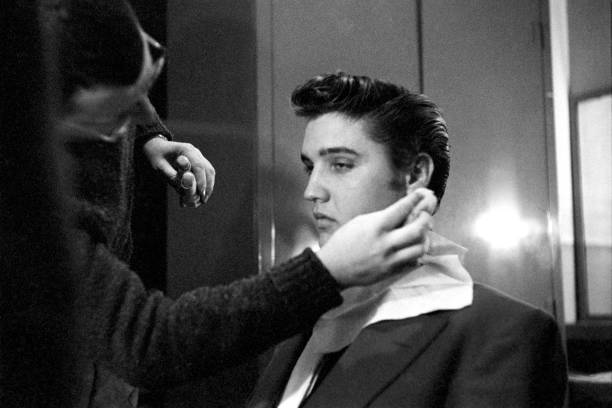 Introduction and Short Summary of the Song
Introduction and Short Summary of the Song
Recorded in 1960 during Elvis Presley’s first sessions after returning from military service, “Such a Night” is a rollicking, high-energy performance that demonstrates his renewed passion for music. Originally written by Lincoln Chase and first recorded by Clyde McPhatter and the Drifters in 1953, the song was already a rhythm-and-blues classic by the time Presley cut his version. Elvis’s recording, included on the album Elvis Is Back!, is a tour de force of rhythm, vocal energy, and playful excitement. The song later became a Top 20 hit when released as a single in 1964, proving its enduring appeal and Presley’s ability to transform R&B standards into rock-and-roll showcases.
Origins of the Song
“Such a Night” was written by Lincoln Chase, an African American songwriter known for his bold and playful compositions. Clyde McPhatter and the Drifters recorded the original in 1953, and their version was celebrated for its joyous vocal delivery and lively rhythm.
---> Scroll down for the VIDEO
Presley, who had long been influenced by R&B artists, was familiar with the Drifters’ recording. When he returned from the U.S. Army in 1960 and entered RCA’s Studio B in Nashville, he sought material that would showcase his versatility. He wanted songs that combined rhythm-and-blues excitement with the polish of contemporary pop. “Such a Night” was an ideal choice—it gave him a chance to channel his R&B influences while putting his own unmistakable stamp on the performance.
Why Elvis Released “Such a Night”
At the time of its recording, Presley was eager to prove that his artistry had not diminished during his two years away from the spotlight. The Elvis Is Back! album was conceived as a statement project, one that would demonstrate his vocal range and musical maturity. Including “Such a Night” allowed him to honor his rhythm-and-blues roots while appealing to a wide audience.
---> Scroll down for the VIDEO
Although not released as a single initially, “Such a Night” became one of the standout tracks on the album. RCA later issued it as a single in 1964 in the UK and the U.S., where it climbed to number 13 on the Billboard Hot 100, confirming its enduring popularity.
The Message Conveyed in the Song
The song’s lyrics describe a night of passion and excitement, filled with romance so overwhelming that it leaves the narrator dazzled:
“It was a night, oooh what a night it was, it really was,
Such a night.”
Unlike Presley’s more dramatic ballads or socially conscious material, “Such a Night” is pure celebration—an exclamation of joy, desire, and unforgettable experience. The message is universal: some moments of passion and love are so powerful that they linger forever in memory.
Presley’s delivery adds a layer of playful intensity to the lyrics. His vocal swoops, growls, and energetic phrasing convey not only the thrill of romance but also the physical excitement of the moment.
The Recording and Musical Characteristics
“Such a Night” is a showcase for Presley’s vocal dynamism and the tight musicianship of the Nashville studio players.
-
Vocals: Presley sings with exuberance, alternating between playful whispers and explosive shouts. His performance is both technically impressive and emotionally uninhibited.
-
Instrumentation: The arrangement features piano, electric guitar, bass, and drums, with a swinging rhythm that propels the track forward. The backing musicians keep the energy taut, allowing Presley to dominate the performance.
-
Mood: Joyous, playful, and slightly risqué, the recording captures the spirit of rhythm-and-blues while adapting it for mainstream rock-and-roll audiences.
-
Production style: The crisp Nashville recording environment gave the track a polished sound, but the energy remains raw and spontaneous.
The performance feels like a live jam session, with Presley feeding off the energy of the band and letting loose vocally.
Cultural and Commercial Impact
Although “Such a Night” was not initially released as a single in 1960, its reputation grew over the years. When RCA issued it as a single in 1964, it quickly became a hit, reaching the Top 20 in both the U.S. and the UK. This late chart success demonstrated the timeless appeal of the recording and Presley’s ability to make R&B classics accessible to a broad audience.
Culturally, the song reaffirmed Presley’s deep ties to rhythm-and-blues traditions. At a time when some critics questioned his relevance in the wake of the British Invasion, “Such a Night” proved that Presley could still deliver music that was vibrant, exciting, and competitive with contemporary rock acts.
The track also illustrated the continuity between 1950s R&B and 1960s pop-rock, with Presley serving as the bridge between the two. His ability to reinterpret African American music with respect and passion helped bring songs like “Such a Night” to mainstream audiences.
Legacy of “Such a Night”
Today, “Such a Night” is remembered as one of the standout tracks from Elvis Is Back! and one of Presley’s most exuberant studio performances. It exemplifies his ability to channel the energy of rhythm-and-blues while adapting it for rock-and-roll audiences without losing its essence.
For fans, the song captures Presley at his most playful and uninhibited. It’s a reminder of the joy and vitality that made him such a revolutionary figure in the first place. His version stands alongside the Drifters’ original as one of the definitive interpretations of the song.
More broadly, “Such a Night” highlights Presley’s artistry in the early 1960s, a period sometimes overshadowed by his later comeback years. It demonstrates that even during a time when his focus was shifting toward films, Presley was still capable of producing electrifying studio recordings.
More than sixty years later, “Such a Night” continues to thrill listeners with its unrestrained energy and vocal fireworks. It is a testament to Presley’s ability to turn a joyful rhythm-and-blues song into an unforgettable rock-and-roll celebration.